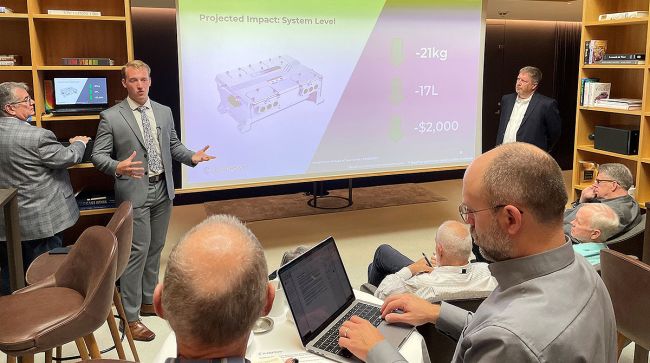MUNICH — Canadian startup eLeapPower said it is bringing its integrated power electronics to the medium-duty battery-electric truck market in North America.
The company’s integrated inverter system is designed to reduce weight, maximize space and save production costs on electric vehicles by integrating multiple functions and eliminating the need for a separate onboard charger.
This integrated inverter currently is in development with an unnamed North American manufacturer of Classes 4-6 electric commercial trucks, the company said at a Sept. 6 briefing with industry press during the IAA 2023 mobility show.
The product is expected to yield more than $2,000 in savings per vehicle for medium-duty truck makers, eLeapPower said.
Jonathan Dooley, engineer and product manager at eLeapPower, said this fundamentally integrated unit provides direct cost savings along with other benefits for original equipment manufacturers.

ELeapPower says its integrated inverter system can reduce the weight and cost of electric vehicles. (eLeapPower)
The system requires less cabling, removes one manufacturing process from the production line and means one fewer part under warranty, he said.
“You’re using one set of components to do two functions rather than two sets of components to do two functions,” Dooley said.
The company also has a development contract with Chinese carmaker Chery Automotive to provide an integrated inverter for a light-duty electric van, with integration and validation expected to be complete by the first quarter of 2024.
Apart from its integrated inverter, eLeapPower also is developing an integrated wireless charging system for electric vehicles that can cut typical wireless charger costs by about 30%.
This product reduces costs and complexity by integrating the wireless charging function with the vehicle’s plug-in charging function.
This integrated wireless charging system is well suited to delivery fleet operations, the company said.
While eLeapPower is currently targeting the electric commercial vehicle market, the company said its technologies are also applicable to electric passenger cars.
The Toronto-based company has raised more than $36 million Canadian dollars in funding to date.






